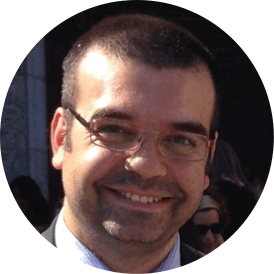Is doubt dangerous to faith?
- Michael Panao
- 14 de ago. de 2016
- 3 min de leitura
I've recently read a post about "6 things Christians should stop saying to people who doubt". I wouldn't say those things either, but what struck me was the idea in the title that, apparently, Christians are people who don't doubt their faith. This is not true.

There's a book by Tomás Halik, Templeton Prize winner of 2014, "Touch His Wounds" (which is not yet translated to English) where he gives a realistic view of Christianity, in particular, Catholicism, and says that our God is wounded, and this is unique among all religions. Moreover, it is a God that, even if for an instant, makes Himself one with atheists and asks from the Cross "My God, my God, why have you forsaken me?"
A Christian that doesn't doubt is in danger of living his/her faith superficially. Simone Weil wrote this image of two prisoners in contiguous cells communicating through the wall. The wall separates them is also what allows them to communicate. This is an excellent image of the way we can view doubt. It might be the wall that separates believers and non-believers, but it is also the way they can communicate. And the same metaphor could apply to us and God.
But then I read another article on "The role of doubt in Science and Faith" by Victor Udowea and I stumbled with some thoughts I found provocative... and right!
Doubt is a driver in science, but the aim is to know, overcome ignorance, thus eradicating doubt. Even if doubt persists because an answer in science should always raise more questions, the idea is that Science is uncomfortable with doubt. The reason why some people convert to atheism is because science provides the certainty of knowledge about reality. Thus, they don't need faith.
In fact, faith is present where doubt is. Victor says something interesting "Doubt might be a stumbling block for science, but it is a stepping stone for faith." In my book, the relation between doubt and faith is part of the questions I answer to my friend. And one of the things I found challenging was closing the cycle of the reciprocal contribution between science and faith.

It is reasonable to think that science clarifies faith from misconceived views of reality, that eventually led to misconceived views of God's action in the world, and even wrong ideas about God himself.
So there is a positive contribute from science to faith. What about the opposite?
I've always thought that faith motivated science, but until I answered a Professor of mine that "faith raises doubts", I wasn't able to close the cycle of reciprocal contribution. I develop this topic with more detail in my book on "Challenges in Science and Faith". But the idea is that faith is an act of trust in the intelligibility of the world. The reason is that the universe is the language through which God speaks to us. And science is our human way to understand that language. Therefore, every Christian should be passionate by science and its descriptions of reality. And afterwards ask, "what is God saying to us?"
If science clarifies faith.
Faith raises doubts
and those doubts
lead to more science.
The cycle of reciprocal contribution
in Science and Faith.
So, what is the best thing Christians should say to people who doubt?
Keep doubting.







Comentários